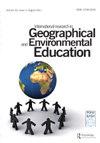地理教科书任务培养获得强大知识的思维技能
IF 3.1
Q2 EDUCATION & EDUCATIONAL RESEARCH
International Research in Geographical and Environmental Education
Pub Date : 2021-03-10
DOI:10.1080/10382046.2021.1885248
引用次数: 13
摘要
摘要任务在培养学生的学习过程中至关重要,思维技能被认为是学习的核心。为了分析任务如何促进学校地理思维技能的发展,我们需要一种超越低级思维和高级思维之间简单区别的工具。在获取强大知识或高认识质量知识的过程中,它应该能够根据不同的元素识别任务类型。在本文中,我们描述了一种基于对现有分类的改编以及使用伯恩斯坦的识别和实现规则的工具的开发。该工具区分了思维的五个层次:低阶思维、思维策略的使用、高阶思维的组成部分、高阶思考和反思。该工具被用于分析荷兰和德国北莱茵-威斯特法伦州使用的地理教科书中的任务,这两个州的研究人员和教师教育工作者认为其有效性既合理又可行。结果表明,该工具足够敏感,可以识别任务类型的差异以及促进获得强大知识的程度。本文章由计算机程序翻译,如有差异,请以英文原文为准。
Geography textbook tasks fostering thinking skills for the acquisition of powerful knowledge
Abstract Tasks are essential in fostering students’ learning processes, and thinking skills are considered to be of central importance to learning. In order to analyse how tasks promote the development of thinking skills in school geography, we need an instrument that looks beyond a simple distinction between lower and higher order thinking. It should be able to identify types of tasks based on distinctive elements on the way to acquiring powerful knowledge or knowledge of high epistemic quality. In this paper, we describe the development of an instrument based on the adaptation of existing categorisations and the use of Bernstein’s recognition and realisation rules. The instrument distinguishes five levels of thinking: lower order thinking, use of thinking strategies, parts of higher order thinking, higher order thinking, and reflection. The instrument was employed to analyse tasks in geography textbooks used in the Netherlands and the German State North Rhine-Westphalia, with researchers and teacher educators in both states considering its efficacy both plausible and practicable. The results show that the instrument is sufficiently sensitive to identify differences in types of tasks and the extent to which access to powerful knowledge is fostered.
求助全文
通过发布文献求助,成功后即可免费获取论文全文。
去求助
来源期刊

International Research in Geographical and Environmental Education
EDUCATION & EDUCATIONAL RESEARCH-
CiteScore
5.20
自引率
33.30%
发文量
11
期刊介绍:
International Research in Geographical & Environmental Education publishes quality research studies within the context of geographical and environmental education. The journal endeavours to promote international interest and dissemination of research in the field, provides a forum for critique, and demonstrates the relevance of research studies to good professional practice.
 求助内容:
求助内容: 应助结果提醒方式:
应助结果提醒方式:


